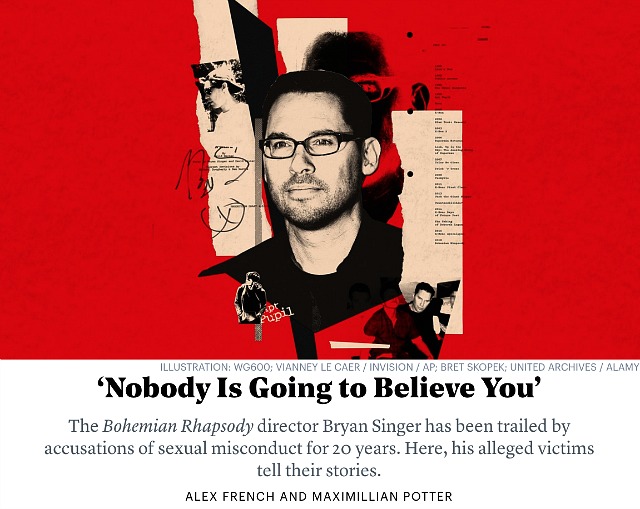A couple of weeks before the 11.2 opening of Bohemian Rhapsody, director Bryan Singer posted an Instagram statement about a long-in-the-works Esquire article about the director’s whole checkered history with twinks, some of which have been called into question.
Singer wrote that the Esquire article would “rehash false accusations and bogus lawsuits” about the sexual assault allegations that have been thrown upon his doorstep.
“I have known for some time that Esquire magazine may publish a negative article about me,” Singer said. “They have contacted my friends, colleagues, and people I don’t even know. In today’s’ climate where people’s careers are being harmed by mere accusations, what Esquire is attempting to do is a reckless disregard for the truth, making assumptions that are fictional and irresponsible.”

Esquire‘s expected publishing of the piece would have presumably been timed to coincide with 20th Century Fox’s Bohemian Rhapsody promotion. Except the article, written by Alex French and Maximillian Potter, never appeared. Not last year, I mean. Now it finally has, but in the Atlantic, not Esquire.
The piece, currently on the Atlantic website, is well-sourced and quite brutal.
Singer’s latest statement, given to Variety‘s Gene Maddaus: “The last time I posted about this subject, Esquire magazine was preparing to publish an article written by a homophobic journalist who has a bizarre obsession with me dating back to 1997. After careful fact-checking and, in consideration of the lack of credible sources, Esquire chose not to publish this piece of vendetta journalism.
“That didn’t stop this writer from selling it to The Atlantic. It’s sad that The Atlantic would stoop to this low standard of journalistic integrity. Again, I am forced to reiterate that this story rehashes claims from bogus lawsuits filed by a disreputable cast of individuals willing to lie for money or attention. And it is no surprise that, with Bohemian Rhapsody being an award-winning hit, this homophobic smear piece has been conveniently timed to take advantage of its success.”
Excerpt from French and Potter’s Atlantic piece: “We spent 12 months investigating various lawsuits and allegations against Singer. In total, we spoke with more than 50 sources, including four men who have never before told their stories to reporters.
“A man we’ll call Eric told us that he was 17 in 1997 when he and Singer had sex at a party at the director’s house; another we’ll call Andy says he was only 15 that same year, when he and Singer had sex in a Beverly Hills mansion. Both men say Singer, who was then in his early 30s, knew they were under 18, the age of consent in California. (They asked The Atlantic to conceal their identity for fear of retaliation, and because they didn’t want certain details about their past made public.)
“The portrait of Singer that emerges is of a troubled man who surrounded himself with vulnerable teenage boys, many of them estranged from their families. Their accounts suggest that Singer didn’t act alone; he was aided by friends and associates who brought him young men. And he was abetted, in a less direct way, by an industry in which a record of producing hits confers immense power: Many of the sources we interviewed insisted, out of fear of damaging their own career, that we withhold their name, even as they expressed dismay at the behavior they’d witnessed.”
HE comment posted on 10.15.18: “Leaving aside the various allegations and suggestions of misbehavior, it seems to me that Singer’s having abandoned the Bohemian Rhapsody shoot before the film was completed could harm his career much more. Who builds a directing career over a quarter-century and then walks off a set or otherwise ‘goes missing’? That’s not eccentric or intemperate behavior — that’s 100% insane.”
